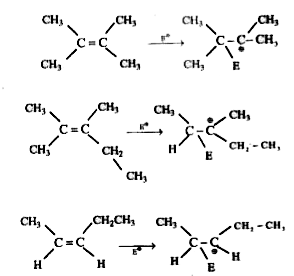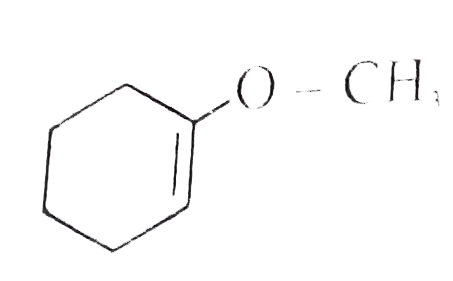Alkenes undergo electrophilic addition with many reagents like HX, , HOCI etc. Except in the case of addition of in other additions carbocation is formed as intermediate. The rate of such reactions depends on the stability of carbocation. Rearrangements and ring expansion are also common in such reactions.
The correct order of reactivity of the following towards electrophilic addition is
P) Vinyl chloride Q) Pent-2-ene
R) 3-methyl pent-2-ene S) 2,3-dimethyl but-2-eneSolution in Telugu
The correct Answer is:C
P with is least reactive as it exerts -I effect and destablises the intermediate carbocations formed Among others the carbocations formed from S, R, Q are

Stability decreases a number of atom decreases reactively decreases.
Topper's Solved these Questions
- BOOK - AAKASH SERIESCHAPTER - HYDROCARBONSEXERCISE - ADDITIONAL PRACTICE SHEET ( LEVEL-II (PRACTICE SHEET (ADVANCED) (LINKED COMPREHENSION TYPE QUESTIONS(PASSAGE-III))))3videos
HYDROCARBONS
- BOOK - AAKASH SERIESCHAPTER - HYDROCARBONSEXERCISE - ADDITIONAL PRACTICE SHEET ( LEVEL-II (PRACTICE SHEET (ADVANCED) (LINKED COMPREHENSION TYPE QUESTIONS(PASSAGE-IV))))3videos
HYDROCARBONS
- BOOK - AAKASH SERIESCHAPTER - HYDROCARBONSEXERCISE - ADDITIONAL PRACTICE SHEET ( LEVEL-II (PRACTICE SHEET (ADVANCED) (LINKED COMPREHENSION TYPE QUESTIONS(PASSAGE-I))))3videos
HYDROCARBONS
- BOOK - AAKASH SERIESCHAPTER - GENERAL ORGANIC CHEMISTRYEXERCISE - QUESTIONS FOR DESCRIPTIVE ANSWERS35videos
GENERAL ORGANIC CHEMISTRY
- BOOK - AAKASH SERIESCHAPTER - HYDROGEN AND ITS COMPOUNDSEXERCISE - QUESTIONS FOR DESCRIPTIVE ANSWERS20videos
HYDROGEN AND ITS COMPOUNDS
Similar Questions
The ozonolysis reactions used to as certain the position of multiple bonds in a substrate. The most widely used ozonolysis is partial reductive ozonlysis, which is also used for preparation of aldehyde and ketones.

An unsaturate Hydrocarbon (A) C.Hreadily gives (B) on treatment with NaNH, with 1-chloropane, C is obtained on partial hydrogenation with Lindaar's catalyst C gives D. On ozonolysis, (D) gives 2,2-dimethyl propanal and 1-butanal.
A is06:25View SolutionBirch reduction : Birch reduction involves controlled reduction of alkynes & atomic compounds in the preseance of alkali metals & alcohol. It provides a method to sterospecifically prepare alkenes of E- configuration R−C≡C−RM,EtOH−−−−−→
The characteristic type of reaction of alkynes is electrophilic addition reaction like alkenes. The alkynes show various reactions such as halagenation, hydration, hydrogenation etc... 0.40 5g sample of hydrocarbon occupies 229.54ml at 100∘C & 1 atm pressure. It decolouses KMnO4 & Br2 water. When it reacts with dil. H2SO4 under appropriate conditions methyl ethyl, ketone is formed
The molecular formula of the hydrocarbon is06:25View SolutionMarkovnikov addition takes place with unsymmetrical alkenes. The positive part of the reagent gets connected to the double bonded carbon with more number of hydrogens. In presence of peroxide and in special cases addition takes place against Markovnikov rule.
In which of the following compound addition takes place against Markovnikov rule07:02View SolutionMention the hybridisation stste of each carbon in the following compounds.
CH3−CH=C=O,CH3−C≡C−CH3,CH3COCH3andCH2=CHCN02:44View SolutionWhy the use of hard water is disadvantages?
01:52View SolutionAlkenes undergo electrophilic addition reactions. Electrophilic addition to unsymmetrical alkenes involve the formation of a more stable carbocation intermediate in the first step which is rate determining and carbocation is then attacked by a nuclephile to form product Which one of the following alkene reacts most readily with HCI ?
02:13View SolutionAlkenes undergo electrophilic addition reactions. Electrophilic addition to unsymmetrical alkenes involve the formation of a more stable carbocation intermediate in the first step which is rate determining and carbocation is then attacked by a nuclephile to form product
 +H2OH2SO4−−−→ Product04:23View Solution
+H2OH2SO4−−−→ Product04:23View SolutionWhich of the following alkenes is expected to be more reactive towards electrophilic addition reactions ?
01:55View SolutionWhy do alkenes undergo electrophilic addition reactions ?
01:44View SolutionWhy do alkenes undergo electrophilic addition reactions ?
43:49View SolutionA : Alkynes is more reactive than alkene towards electrophilic addition reaction. R : Alkynes form stable carbocation than alkene.
40:47View SolutionAlkenes undergo electrophilic addition with many reagents like HX, H_2O , HOCI etc. Except in the case of addition of X_2^(-) in other additions carbocation is formed as intermediate. The rate of such reactions depends on the stability of carbocation. Rearrangements and ring expansion are also common in such reactions. The correct order of reactivity of the following towards electrophilic addition is P) Vinyl chloride Q) Pent-2-ene R) 3-methyl pent-2-ene S) 2,3-dimethyl but-2-ene
45:54View SolutionAlkenes undergo electrophilic addition with many reagents like HX, H_2O , HOCI etc. Except in the case of addition of X_2^(-) in other additions carbocation is formed as intermediate. The rate of such reactions depends on the stability of carbocation. Rearrangements and ring expansion are also common in such reactions. 1-methylcyclohex-1-ene is subjected to hydro-boration oxidation. The product is
47:16View SolutionAlkenes undergo electrophilic addition with many reagents like HX, H_2O , HOCI etc. Except in the case of addition of X_2^(-) in other additions carbocation is formed as intermediate. The rate of such reactions depends on the stability of carbocation. Rearrangements and ring expansion are also common in such reactions. Propene on reaction with HI in presence of peroxide will give
01:00:52View SolutionElectrophilic Addition Reactions (Classical Carbocation)
01:16:22View SolutionElectrophilic Addition Reactions (Classical Carbocation) Continued
26:24View Solution
